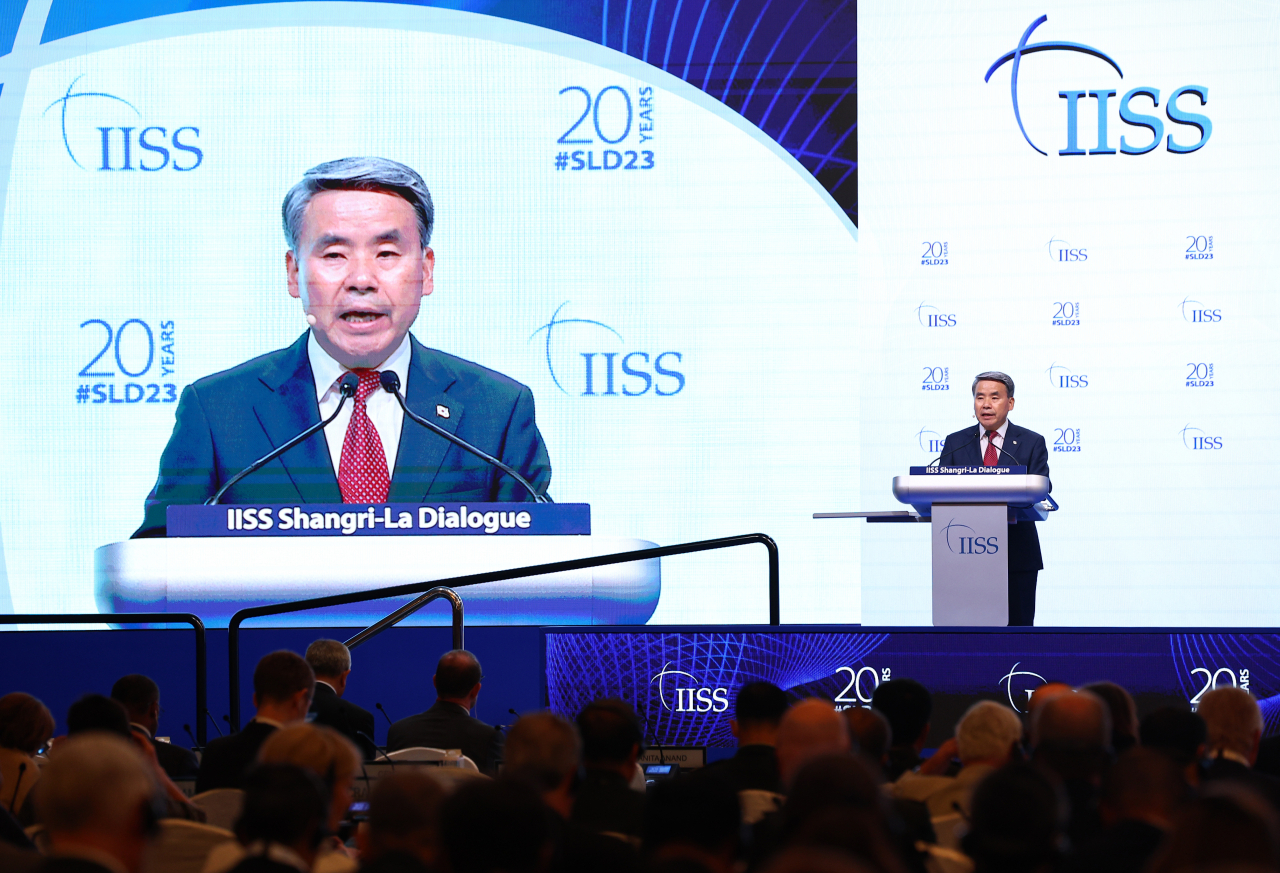S. Korean defense chief criticizes China, Russia for neglecting illegal NK actions
By Ji Da-gyumPublished : June 3, 2023 - 16:27

SINGAPORE — The South Korean defense minister denounced China and Russia for neglecting their responsibility to hold North Korea accountable for its ongoing illegal actions, including ballistic missile launches.
Defense Minister Lee Jong-sup made the rare criticism in his keynote speech at the Shangri-La Dialogue, a gathering that attracted defense ministers and high-level delegates from over 40 countries, including Australia, the United States, China, Japan, Ukraine and the European Union.
Lee did not explicitly name China and Russia. But he clearly attributed blame to the veto-wielding permanent members of the UN Security Council for their refusal to take action against North Korea's ongoing ballistic missile launches.
"Some countries are ignoring North Korea's unlawful behaviors that violate the rule-based order. This creates holes in sanctions against North Korea, passed at the UN Security Council," Lee said.
"And due to objections by countries with responsibilities, despite North Korea's unprecedented number of missile launches last year, not a single additional UNSC Resolution was able to pass."
Lee's speech came days after North Korea's announcement of its intention to launch a military reconnaissance satellite, following a failed attempt earlier this week. South Korea believes the launch to be of a long-range ballistic missile. This satellite launch by North Korea is in clear violation of multiple resolutions of the UN Security Council, as it involves the use of ballistic missile technologies.
But the UN Security Council’s 15 members on Friday failed to take any action against North Korea's latest launch as China and Russia openly defended North Korea's illegal act.
"North Korea is the only country that threatens a preemptive attack with nuclear weapons against a specific country," Lee said.
He also stressed the importance of the international community displaying "resolute and united strength by passing UNSC resolutions."
"With such a united action, we need to change the Kim regime's calculation," Lee said. "We also need to make the regime realize that coercion and threats will never be rewarded as showcased through the war in Ukraine."
Lee said that the reckless nuclear and missile development has been escalating concerns regarding nuclear proliferation, ultimately leading to a regional arms race.
"As a result, the security dilemma of rising security costs for each country is expanding."
In the given context, Lee emphasized the importance of enhancing bilateral security cooperation between Japan and South Korea, as well as trilateral security cooperation involving South Korea, Japan and the United States. He highlighted that such collaboration is an "inevitable measure taken to protect regional freedom and peace from the advancing North Korean nuclear and missile threats."
"North Korean threats are that major a challenge that deeply agitates the structure of regional security."
In his speech, Lee also drew attention to the dire human rights situation in North Korea, and strongly condemned the Kim Jong-un regime for prioritizing the purchase of food over the development of nuclear weapons and missiles.
Lee highlighted that the deplorable human rights conditions in North Korea deviate from the universal values that the international community strives to uphold and "damage the values of freedom, rule of law and human rights in the Indo-Pacific."
"The North Korean human rights challenge is no longer a problem of an individual country," he said. "Rather, it is a collective task, for which all members of the Indo-Pacific must together condemn and look for solutions."
Meanwhile, during his speech on the topic of US leadership in the Indo-Pacific, US Defense Secretary Lloyd Austin emphasized the ongoing efforts by the United States and South Korea to enhance US extended deterrence. Austin highlighted that these efforts are crucial as "North Korea continues its nuclear threats, missile tests, and other dangerous provocations."
Speaking at the Shangri-La Dialogue, Defense Secretary Austin outlined the collective efforts of the allies, which encompassed increased deployments of the US most advanced assets and the historic Washington Declaration signed by US President Joe Biden and President Yoon following the April 26 Summit in Washington.
"We're cooperating more deeply than ever with the ROK on joint planning, exercises, information-sharing, and more," Austin stated, using the acronym for South Korea's official name, the Republic of Korea
Austin further emphasized the significance of strengthening security cooperation among South Korea, the US and Japan in response to the ongoing missile and nuclear threats from North Korea. He acknowledged the notable strides taken by South Korea and Japan to enhance their collaboration, referring to these measures as "bold steps" by the two countries to work more closely together.
"Strong ties between Tokyo and Seoul are good for both countries -- and for the region," Austin said. "And we've made tremendous progress in our own trilateral cooperation with Japan and the ROK, including more regular military exercises and greater information sharing."




![[Herald Interview] 'Amid aging population, Korea to invite more young professionals from overseas'](http://res.heraldm.com/phpwas/restmb_idxmake.php?idx=644&simg=/content/image/2024/04/24/20240424050844_0.jpg&u=20240424200058)













![[KH Explains] Korean shipbuilding stocks rally: Real growth or bubble?](http://res.heraldm.com/phpwas/restmb_idxmake.php?idx=652&simg=/content/image/2024/04/25/20240425050656_0.jpg&u=)

